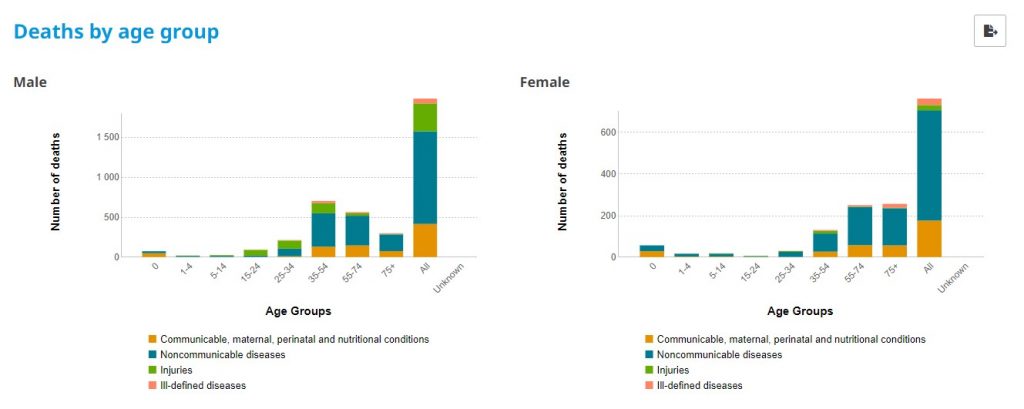
Qatar, with its rapid population growth from 750,000 to 2.5 million, is facing a significant health crisis predominantly driven by noncommunicable diseases (NCDs). These conditions, including cardiovascular diseases, cancer, and diabetes, are the leading causes of morbidity, mortality, and disability in the nation. With over two-thirds of all deaths in Qatar attributable to chronic conditions, it is clear that immediate action is necessary to mitigate this crisis and improve the overall health of the population.
The Prevalence of Noncommunicable Diseases in Qatar
According to the Qatar National Health Strategy 2018-2022, cardiovascular disease, cancer, and diabetes are the primary contributors to mortality, accounting for 24%, 18%, and 7% of all deaths, respectively. These statistics align with estimates from the World Health Organization (WHO), highlighting the severity of the issue. Behavioral risk factors such as physical inactivity, unhealthy diet, and tobacco use are prevalent among Qatar’s population, exacerbating the rates of diabetes, cardiovascular disease, and obesity.
A staggering 70% of adults in Qatar are overweight, with 46% exhibiting low levels of physical activity. In 2016, the prevalence of diabetes among adults was 13%, significantly higher than the global average of 8.5%. These factors not only pose a severe threat to individual health but also contribute to a broader economic burden on the country.
Economic Impact of Noncommunicable Diseases
NCDs have a profound economic impact on Qatar, costing the economy QR 18.1 billion (US$5 billion) annually, which is equivalent to 2.72% of its 2019 GDP. These costs encompass QR 7.2 billion (US$2 billion) in healthcare expenditures and QR 10.9 billion (US$3 billion) in lost productive capacities due to premature mortality, disability, and workplace losses. The productivity losses from current NCDs account for 60% of all NCD-related costs, indicating that these diseases significantly hinder the country’s development beyond health.
Cardiovascular diseases have the greatest impact on the economic burden of NCDs, contributing to 73% of the total burden (QR 13 billion). Indirect costs, such as reduced workforce participation and loss in national productivity, contribute more than direct healthcare spending to the total cardiovascular disease burden, underscoring the broader societal impact of these conditions.
Key Findings on Health Issues in Qatar
1. Obesity: Qatar is facing an obesity epidemic, with 70.1% of Qatari nationals being overweight and 41.4% classified as obese. These rates are significantly higher than the WHO’s global prevalence estimates, highlighting the severity of the issue.
2. Physical Inactivity and Poor Diet: The lack of physical activity and poor dietary habits are major contributors to the high prevalence of cardiovascular disease, type 2 diabetes, and certain cancers in Qatar. These lifestyle factors also contribute to a weakened immune system and poor bone and joint health.
3. Cardiovascular Disease: As the leading cause of death from NCDs in Qatar, cardiovascular diseases accounted for 33% of all deaths in 2019.
4. Diabetes: The burden of diabetes is expected to increase, with a projected rise in prevalence from 17.8% in 2023 to 29.5% by 2050 among adult Qataris aged 20-79 years. Obesity is a major driver of this epidemic, accounting for 57.5% of diabetes cases.
Reducing the Burden of NCDs in Qatar
By implementing effective prevention measures, Qatar can significantly reduce the burden of NCDs, avert economic losses, and save lives. According to estimates, preventive measures could avert QR 27 billion (US$7.5 billion) in economic output losses and save over 24,600 deaths. These measures include enacting clinical intervention packages for cardiovascular disease and diabetes, which would prevent the most deaths, followed by salt reduction packages. Each WHO-recommended ‘best buy’ intervention package offers economic benefits that outweigh the costs, with significant returns on investment.

The Role of Fedo Vitals in Combatting NCDs in Qatar
Fedo Vitals is an innovative health technology that empowers individuals to monitor their health through a simple 14-second face scan. This groundbreaking solution provides three key benefits:
1. Checking Vitals: Fedo Vitals measures vital signs such as heart rate, blood pressure, diabetes, BMI, and respiratory rate. etc. from a face scan, providing immediate feedback on an individual’s health status.
2. Health Risk Assessment: The technology analyzes facial data to identify potential health risks, including early signs of cardiovascular disease, diabetes, and other chronic conditions. This early detection enables timely intervention and lifestyle adjustments to prevent the progression of these diseases.
3. Medical Cost Prediction: Fedo Vitals predicts expected medical costs based on the individual’s health data, allowing for better financial planning and management of healthcare expenses.
Given the health challenges faced by Qatar, Fedo Vitals can play a crucial role in mitigating the impact of NCDs. Here’s how:
1. Accessible Health Monitoring: The 14-second face scan is quick, non-invasive, and accessible, making it easier for individuals to regularly check their health status. This convenience encourages more frequent health monitoring, which is essential for early detection and management of NCDs.
2. By identifying health risks early: Fedo Vitals allows individuals to seek medical advice and make lifestyle changes before conditions worsen. For instance, detecting early signs of cardiovascular disease or diabetes can prompt individuals to adopt healthier diets, increase physical activity, and avoid tobacco use, significantly reducing their risk of developing severe complications.
3. Empowering Preventive Care: With the ability to predict medical costs, individuals can plan for their healthcare needs more effectively. This financial foresight can motivate people to invest in preventive measures, such as regular check-ups and health screenings, which are crucial for managing and preventing NCDs.
4. Supporting Public Health Initiatives: Fedo Vitals can support national health strategies by providing aggregate data on population health trends. This data can help public health authorities identify high-risk groups and areas, enabling targeted interventions and resource allocation to address the most pressing health issues.
5. Reducing Economic Burden: By promoting early detection and preventive care, Fedo Vitals can help reduce the overall economic burden of NCDs on Qatar. Fewer hospital admissions, reduced need for long-term treatment, and lower healthcare costs can free up resources for other critical areas of development.
6. Improving Workforce Productivity: Healthier individuals contribute to a more productive workforce. By preventing the onset of chronic diseases and managing existing conditions effectively, Fedo Vitals helps ensure that fewer people drop out of the workforce due to illness, thereby supporting Qatar’s economic growth.
In conclusion, Qatar is facing a significant health crisis driven by noncommunicable diseases, which pose a severe threat to both individual health and the nation’s economy. By implementing effective prevention measures and utilizing innovative solutions like Fedo Vitals, Qatar can mitigate the impact of these diseases, improve public health, and secure a healthier future for its population.
Interested in seeing how AI-powered health screening can transform public health? Contact us at hello@fedo.ai for a demo.